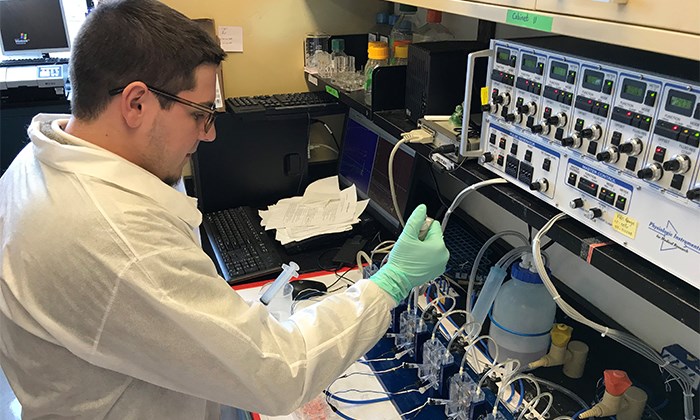Let’s Talk About What a CF Cure Really Means

(Courtesy of Tré LaRosa)
If you read my column last week, you know I care a lot about the interpretation of words. The word “cure” holds tremendous gravity in the cystic fibrosis community and for scientists. It’s the Holy Grail of CF science and what we ultimately work toward.
CF is a progressive disease, meaning that our bodies become increasingly damaged as we get older. Our lungs scar, many of us develop CF-related diabetes, and we accrue different maladies throughout a lifetime of a poorly functioning cystic fibrosis transmembrane conductance regulator (CFTR). Due to this, fixing the underlying cause — a broken CFTR caused by a mutation — won’t necessarily alleviate all of the older CF population’s issues.
A genetic cure for CF means that our CFTR protein starts functioning properly, which leads to proper chloride transport in epithelial cells, which means thinner mucus. This would obviously be great, but due to our long-term issues, adults have vast networks of scar tissue in the affected organs. Lungs with functioning CFTR and thinner mucus don’t automatically recover all of that detrimental lung function because the long-term effects of infection and inflammation have narrowed our bronchi. Many of us are pancreatic insufficient for most of our lives, so a sudden correction of our genetic issue won’t totally repair our damaged pancreas.
Join the Cystic Fibrosis News Today forums: an online community for people with CF and their caregivers.
I’m not saying a cure is impossible or undesirable. Rather, there are multiple pillars to ultimately curing all the ills that deeply affect our lives. I think looking at a cure in this way is a reason to be hopeful. It’s a bright time in CF medicine. We continue to broaden access to a variety of CFTR modulators, and it looks like they will only continue to get better. Additionally, more anti-infective medications are under development, anti-inflammatories are a hot topic, and there are movements to improve transplant medicine.
Cystic fibrosis is complicated. It affects our lungs, pancreas, gastrointestinal tracts, reproductive tract, sinuses, and more. Clinicians have to be both proactive and reactionary; they have to balance preventing future issues while also nipping any issue in the bud as quickly as possible. Over 1,700 mutations, usually separated into classes, affect the global CF population. Since mutations are genetic, a cure would likely need to be designed differently for every mutation class. It also means there would be a wide variety of outcomes in the different classes of mutations.
I want to stress that I don’t believe this is a reason for discouragement. We’ve learned so much about CF and the CFTR protein over the last 30 years — we’ve made great progress. The reality is that we have treatments shown to improve the underlying genetic issue and that these therapies improve quality of life. I don’t think most adults with CF dreamed of these therapies existing 10 years ago.
It’s important to think realistically and understand the issues. With a firm understanding of the current reality at hand, we can frame our hopes and expectations differently. That paradigm shift gives us reason to be optimistic that brighter days are ahead.
I hope for a CF cure. But right now, I’m confident that better modifiers, antibiotics, and anti-inflammatories are on the horizon. As these medications are released, even better medications will enter the pipeline. As we ride these waves of success, our lives will continue improving until one day a cure is found.
Follow along with my other writings on my humbly named site, www.trelarosa.com.
***
Note: Cystic Fibrosis News Today is strictly a news and information website about the disease. It does not provide medical advice, diagnosis, or treatment. This content is not intended to be a substitute for professional medical advice, diagnosis, or treatment. Always seek the advice of your physician or other qualified health provider with any questions you may have regarding a medical condition. Never disregard professional medical advice or delay in seeking it because of something you have read on this website. The opinions expressed in this column are not those of Cystic Fibrosis News Today, or its parent company, Bionews Services, and are intended to spark discussion about issues pertaining to cystic fibrosis.








Andrew Shaw
Hi - interesting article - one thing I think is important is that our condition only gets worse and worse over time and any delay to starting treatment can only be detrimental to our health .... which is why the current unavailability of Vertex drugs for most of us is very worrying here in the UK (we rely on the National Health Service and there is no current deal between Vertex and the NHS.)
Tim Blowfield
While treatment is getting better there is great ignorance in the professions and a reluctance to treat "other illnesses" a patient may have on the presumption that "she will die soon". CF is so complicated. In our case it has caused heart disease (Cardiomyopathy) and endocrine glands are affected (Hyperparathyroidism / adrenal insufficiency / even pituitary failure???). It certainly appears that the CFTR gene is involved - how & why is unknown and too many put it in the 'too hard basket'. Is Sjogren's Syndrome in a CF person a result of years of immunostimulation in the chronically inflamed lungs, gut. pancreas, nose etc. Quite probable - but it is not understood. SS in CF may be quite a different disease to that in a 'normal' person. So much still to be done. So much to be learnt 'outside the box'.